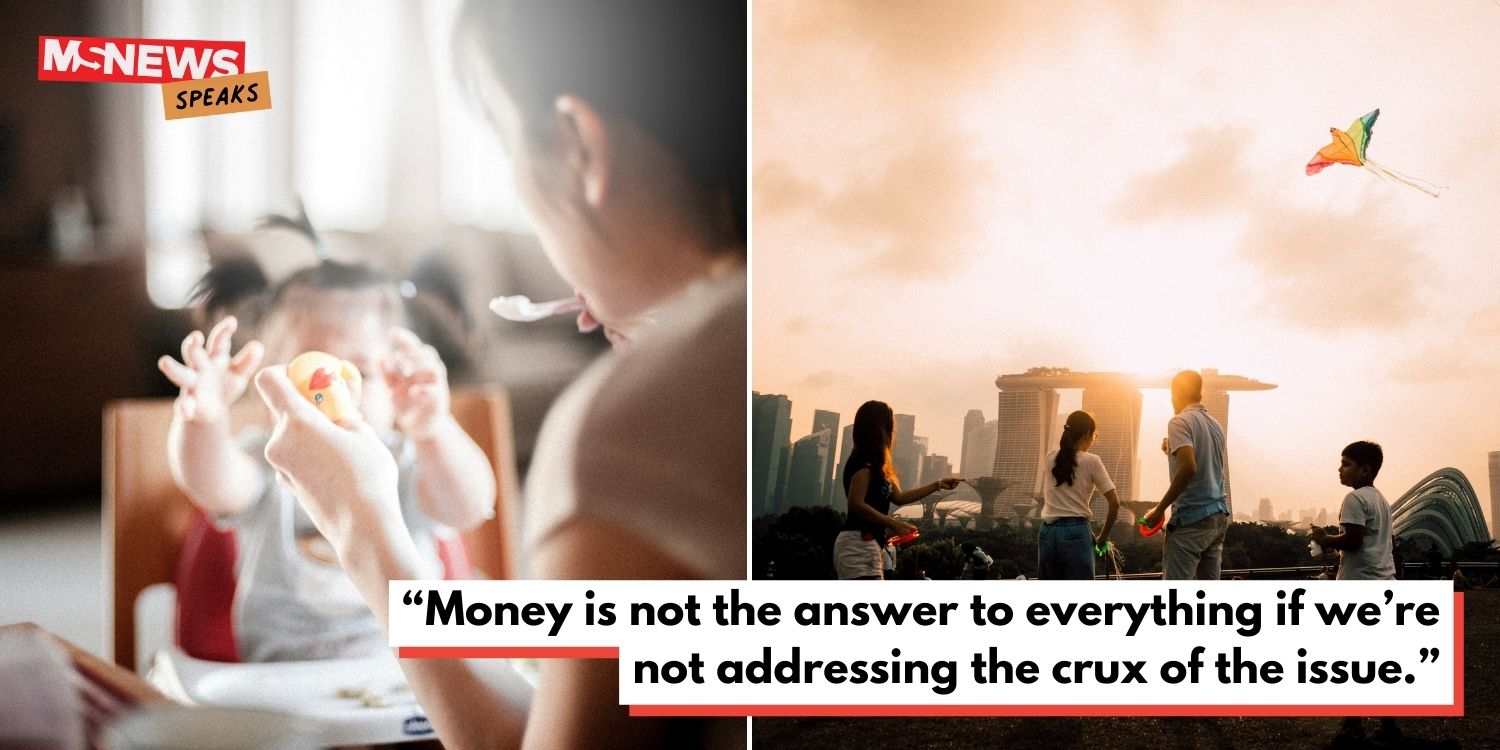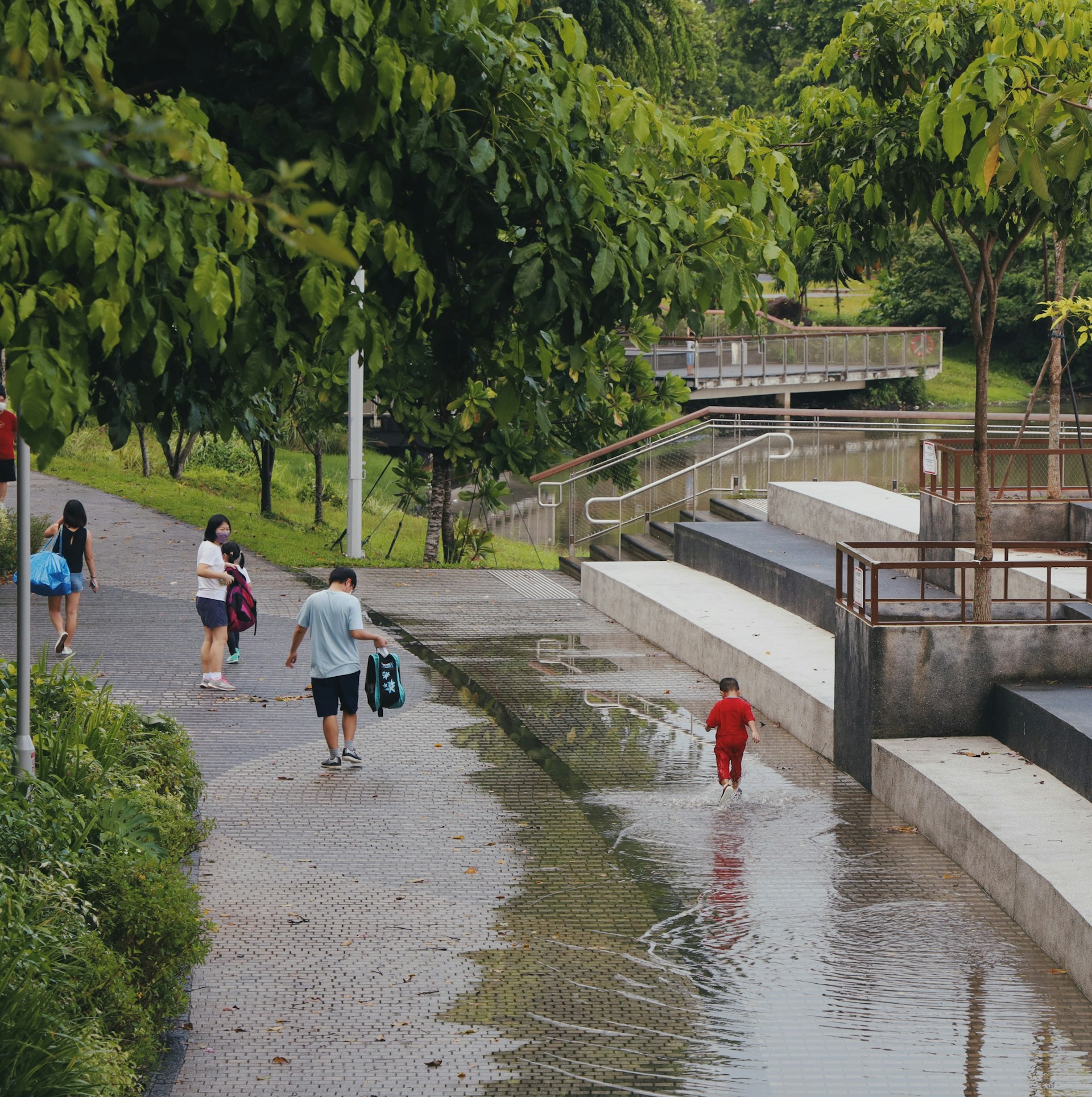Singaporeans not having babies: DPM Wong has to stop being safe if he wants to arrest declining fertility
This piece is part of MS Speaks, a segment in which MS News reporters share their honest views on current affairs and trending topics.
–
With Deputy Prime Minister (DPM) Lawrence Wong set to take over the reins from PM Lee Hsien Loong on 15 May, he has got his work cut out for him.
While it can be said that PM Lee is handing over a relatively stable and successful Singapore — its economy grew 2.7% in Q1 — domestically, gripes about certain policies remain.
A lack of affordable, timely housing, rising cost of living, growing ageing population, and a highly competitive education system are some complaints, to name a few.
In my view, one of the issues DPM Wong should look into when he takes on the top job is tackling the country’s dismal and continually declining fertility rate. It has dropped to a historic low of 0.97 — a long shot from the desired 2.1 replacement rate.
The urgency of this is clear.
In February, PM Lee exhorted Singapore couples during his Chinese New Year speech to “add a little dragon” to their families.

Source: PM Lee Hsien Loong on X
It’s a familiar refrain. Each time our fertility rate plummets to a new low, our political leaders will make an impassioned plea for Singaporeans to, well, have more babies.
We’ll soon see DPM Wong do the same thing, if nothing bold is done.
To its credit, the Government has been pulling out the stops to support Singaporeans in their parenthood journey, attempting to defray costs through enhanced Baby Bonus incentives and housing grants, Child Development Account payouts and the introduction of increased paternity leave.
But beyond these monetary incentives and calls for Singaporeans to start a family or have bigger ones, it makes one wonder if there is a disconnect between the type of support that the Government thinks parents need, versus the realities on the ground.
Are policymakers speaking to parents and taking their requests into account?
A recent Answers.sg poll found that only 23% of more than 900 respondents wish to have a baby in 2024.
An increased financial burden, lack of domestic support networks and women desiring to focus on their career were some of the more commonly cited reasons for those who declined to do so.
Policies and incentives aimed at boosting birth rates must change couples’ minds about not having children, while sweetening the deal for those who have already decided to do so. Otherwise, we’re preaching to the converted.
To put it bluntly, money isn’t the answer to everything if we’re not addressing the crux of the issue — as a mother of two young kids, I would know.
DPM Wong now has a chance to rethink existing policies that are burdened by legacy issues.
He himself has said he’d like to add new perspectives and “re-examine and refresh our current approaches”.
I hope this signifies a willingness to break new ground, and a keenness for concrete change.
Below is my wishlist for DPM Wong.
Guarantee childcare spots near home
In 2018, I decided to go back to work after caring for my firstborn for eight months. My husband and I had no parents on either side who were capable of helping out. Save for a few close friends, we were largely alone as we meandered the challenges of parenthood on our own.

Source: Minnie Zhou on Unsplash
So our next best option was infant care and the first challenge we faced was the lack of available options nearby.
Pre-schools between a two and four kilometre radius of our home either did not offer such services, or had no vacancies. We ended up getting one that was about a 10-minute drive away.
And it got worse when we had our second child.
Every day was a frenzy dropping kids off at two different locations before we headed to work, and come evening time, it was another crazy dash to leave work on time and pick both by 7pm. Any later and their schools “fined” us, despite our best efforts.
God help us if we ever decide to have a third kid. Three trips — first child at primary school, second child at childcare, and third at infant care — while still trying to be a competent working professional? I think not.
Having guaranteed infant and childcare spots near a parent’s home will alleviate stress and encourage people to have more babies.
Be more generous with childcare leave
Apart from weekends and public holidays, there are additional closures for pre-schools to cater for staff training, company retreats and learning days.
On average, each childcare centre closes for a total of six days every year — meaning the childcare leave quota is immediately expended, with no excess for emergencies.

Source: Singapore Stock Photos on Unsplash
And the quota remains the same even if one has two children in separate schools with different school closure dates.
So when children fall sick, which unsurprisingly, is pretty often, parents have to take annual leave to care for them at home.
And the impact of this adhoc absence from work on the parents’ careers can be damaging. Not to mention – it’s a toll on the parents’ mental health, too. This would hardly entice people to have babies.
So what can we do, without compromising our overall productivity?
Could the Government consider increasing the quota of childcare leave beyond six days? Alternatively, it could implement a universal care leave to make the workplace fairer and improve acceptance of those with family obligations, as some experts have suggested.
Set conditions to make life a little more convenient
Small, seemingly inconsequential matters could have a large effect in moving the needle.
Something as simple as offering subsidies and rebates to help parents afford their first car would go a long way.
Convenience matters a lot to someone considering having children. No sane person would say yes to the thought of having to juggle prams, bags and other baby essentials on top of handling or carrying their children on the MRT or public bus.
For years, many have been calling for the Certificate of Entitlement (COE) system to be relooked. It favours the wealthy and does not serve people with real needs.
The Government can look at prioritising the latter group and helping those who really need a car, versus those who are purchasing their second, third or fourth vehicles.
Workplaces should encourage more babies
Women are constantly under pressure to do it all, and do it well.
DBS’s CEO Piyush Gupta acknowledged this in his recent Linkedin post, pointing out that women “continue to work a second shift, requiring them to put in significantly longer hours than men”.
He added: “Till we redress this, women will continue to bear a disproportionate burden.”
It’s no wonder women here are balking at talking on the extra load.
Some companies are already taking steps to make employees feel more at ease about having children.
DBS, for example, allows all parents of newborns to have the flexibility to work from home 100% of the time for up to 6 months (on top of mandated entitlements). All employees with newborn children, regardless of gender, can claim up to S$5,000 to defray the medical expenses of giving birth.
Since January this year, the bank has also provided male employees with an additional two weeks of paid paternity leave on top of the Government’s mandated two weeks.
Meanwhile, employees at Standard Chartered Bank get 20 weeks of paid parental leave irrespective of gender, while HP employees can request for more flexibility, such as hybrid work arrangement, flexi-time, telecommuting and compressed work schedules.
It’s great that some companies are offering such attractive benefits, but they are the exception rather than the norm.

Source: K8 on Unsplash
Research has also shown that some employees avoid taking advantage of workplace parental benefits for fear of being penalised at work.
The Government should lead the way and institutionalise benefits so there’s no two-ways about it. For instance, mandating paid parental leave of 24 weeks or more — regardless of gender.
Just for reference, South Korea offers each parent 18 months of paid parental leave. Parents in Sweden are entitled to a total of 480 days off work, of which most parents can claim benefits equivalent to 80% of their salaries for the first 390 days.
Singapore’s 16 weeks paid maternity leave and four weeks paid paternity leave is hardly comparable.
The joy of parenting comes from parenting
I’ve always been puzzled by the state of things in Singapore. We strongly advocate having more children — but we place emphasis on productivity at the same time.
We have more children, only to outsource their care to someone else.
While the monetary incentives are helpful, they’re not the main reason why people choose to parent.

Source: Alaric Sim on Unsplash
Humans are emotional creatures and will choose a life path based on how it fits into their values and whether it’s purposeful.
The Government should focus on the “softer” side of parenting, letting couples have the chance to actually parent and enjoy the joy and fruits of parenting.
This means actual steps need to be taken to ensure parents get quality time with kids to appreciate this journey.
Some European countries are experimenting with a four-day work week. In Belgium, workers also have the right to turn off work devices and ignore work-related messages after hours without fear of reprisal.
Australian employees work up to 38 hours in a week, compared to those in Singapore who work 44 hours and more.
We’ve been talking about work-life balance for the longest time, but nothing striking has been done to move the needle.
Employees here continue to suffer from burnout, with trickle down effects to mental health. A four-day work week might be the solution, or mandated shorter working hours, so people can dedicate themselves to their families.
Be bolder, if you want results
The truth is, caring for children can be soul-sapping. An incredibly fulfilling and purposeful endeavour, yes, but also really exhausting and consuming in every aspect of one’s life.
When faced with multiple pressures from work and more, many will feel reluctant to invest their time and energy on having children.
We need to normalise prioritising family time and well-being, in general.
Once couples see that parenting can be satisfying, joyful, affordable, and relatively fuss-free, the rest will follow.
But we must take bold and aggressive steps to correct our trajectory before it’s too late.
Note: The views expressed within this article are the author’s own.
Have news you must share? Get in touch with us via email at news@mustsharenews.com.
Featured image adapted from Tanaphong Toochinda on Unsplash and John T on Unsplash.

Drop us your email so you won't miss the latest news.










